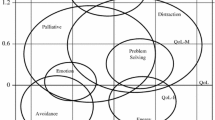Abstract
The aim of this study was to assess the impact of psychological features in the choice of coping strategies in multiple sclerosis (MS) patients, and their influence on quality of life (QoL). One hundred four patients (72 women, age 45.3 ± 10.9 years, disease duration 17.9 ± 13.2 years, Expanded Disability Status Scale 2.8 ± 2.0) were assessed through the Beck Depression Inventory, the State-Trait Anxiety Inventory, the Eysenck Personality Questionnaire, the Coping Orientation for Problem Experiences-New Italian version and the MSQoL-54. MS patients were less likely to use problem-focused strategies, whereas avoiding strategies were adopted more frequently. The use of positive strategies positively influenced both mental and overall QoL. Depression had a negative impact on all QoL domains and anxiety on mental domains. These data point out the importance of a comprehensive assessment of MS patients. Orienting therapeutic interventions, to oppose depression and anxiety and to favour more appropriate coping strategies can improve the patients’ QoL.
Similar content being viewed by others
References
Sadovnick AD, Remick RA, Allen J et al (1996) Depression and multiple sclerosis. Neurology 46:628–632
Siegert RJ, Abernethy DA (2005) Depression in multiple sclerosis: a review. J Neurol Neurosurg Psychiatry 76:469–475
Amato MP, Ponziani G, Rossi F et al (2001) Quality of life in multiple sclerosis: the impact of depression, fatigue and disability. Mult Scler 7:340–344
Bakshi R (2003) Fatigue associated with multiple sclerosis: diagnosis, impact and management. Mult Scler 9:219–227
Korostil M, Feinstein A (2007) Anxiety disorders and their clinical correlates in multiple sclerosis patients. Mult Scler 13:67–72
Galeazzi GM, Ferrari S, Giaroli G et al (2005) Psychiatric disorders and depression in multiple sclerosis outpatients: impact of disability and interferon beta therapy. Neurol Sci 26:255–262
Minden SL, Orav J, Reich P (1987) Depression in multiple sclerosis. Gen Hosp Psychiatry 9:426–434
Stenager E, Knudsen L, Jensen K (1994) Multiple sclerosis: correlation of anxiety, physical impairment and cognitive dysfunction. Ital J Neurol Sci 15:97–101
Montel SR, Bungener C (2007) Coping and quality of life in one hundred and thirty-five subjects with multiple sclerosis. Mult Scler 13:393–401
McCabe MP, McKern S (2002) Quality of life and multiple sclerosis: comparison between people with multiple sclerosis and people from the general population. J Clin Psychol Med Settings 9:287–295
Mohr DC, Goodkin DE, Gatto N et al (1997) Depression, coping and level of neurological impairment in multiple sclerosis. Mult Scler 3:254–258
Lynch SG, Kroencke DC, Denney DR (2001) The relationship between disability and depression in multiple sclerosis: the role of uncertainty, coping, and hope. Mult Scler 7:411–416
Kroencke DC, Denney DR (1999) Stress and coping in multiple sclerosis: exacerbation, remission, and chronic subgroups. Mult Scler 5:89–93
Warren S, Warren KG, Cockerill R (1991) Emotional stress and coping in multiple sclerosis (MS) exacerbations. J Psychosom Res 35:37–47
Ratsep T, Kallasmaa T, Pulver A et al (2000) Personality as a predictor of coping efforts in patients with multiple sclerosis. Mult Scler 6:397–402
McDonald WI, Compston A, Edan G et al (2001) Recommended diagnostic criteria for multiple sclerosis: guidelines from the International Panel on the diagnosis of multiple sclerosis. Ann Neurol 50:121–127
Beck AT, Ward CH, Mendelson M et al (1961) An inventory for measuring depression. Arch Gen Psychiatry 4:561–571
Spielberg CD, Gorsuch RL and Luskene RE (1996) STAI, State-Trait Anxiety Inventory, Forma Y. Organizzazioni Speciali, Florence
Vickrey BG, Hays RD, Harooni R et al (1995) A health-related quality of life measure for multiple sclerosis. Qual Life Res 4:187–206
Eysenck SBG (1985) Cross-cultural comparison of personality for Italian, Sicilian and British subjects. Boll Psicol Appl 176:11–16
Eysenck HJ, Eysenck SBG (1975) Manual of the Eysenck personality questionnaire. Hodder and Stoughton, London
Sica C, Magni C, Ghisi M et al (2008) Uno strumento aggiornato per la misura degli stili di coping: il Coping Orientation to the Problems Experienced-Nuova Versione Italiana (COPE-NVI). Psicoterapia Cognitva e Comportamentale 14:27–53
Krupp LB, LaRocca NG, Muir-Nash J et al (1989) The fatigue severity scale. Application to patients with multiple sclerosis and systemic lupus erythematosus. Arch Neurol 46:1121–1123
Lazarus R and Folkman S (1984) Stress, appraisal and coping
Benedict RH, Priore RL, Miller C et al (2001) Personality disorder in multiple sclerosis correlates with cognitive impairment. J Neuropsychiatry Clin Neurosci 13:70–76
Christodoulou C, Deluca J, Johnson SK et al (1999) Examination of Cloninger’s basic dimensions of personality in fatiguing illness: chronic fatigue syndrome and multiple sclerosis. J Psychosom Res 47:597–607
Yamaoka K, Shigehisa T, Ogoshi K et al (1998) Health-related quality of life varies with personality types: a comparison among cancer patients, non-cancer patients and healthy individuals in a Japanese population. Qual Life Res 7:535–544
Benedict RH, Wahlig E, Bakshi R et al (2005) Predicting quality of life in multiple sclerosis: accounting for physical disability, fatigue, cognition, mood disorder, personality, and behavior change. J Neurol Sci 231:29–34
Author information
Authors and Affiliations
Corresponding author
Rights and permissions
About this article
Cite this article
Goretti, B., Portaccio, E., Zipoli, V. et al. Coping strategies, psychological variables and their relationship with quality of life in multiple sclerosis. Neurol Sci 30, 15–20 (2009). https://doi.org/10.1007/s10072-008-0009-3
Received:
Accepted:
Published:
Issue Date:
DOI: https://doi.org/10.1007/s10072-008-0009-3




